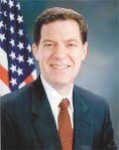Brownback introduces public diplomacy legislation

WASHINGTON -- U.S. Senator Sam Brownback today introduced legislation that would establish the National Center for Strategic Communications, an agency similar to the now defunct U.S. Information Agency.
"As America continues to fight the war on terrorism, we cannot rely upon military force alone to defeat the threat posed by Islamist extremism," said Brownback. "Violence is increasing in Afghanistan, Pakistan and other places, and the ideas behind this violence continue to proliferate from Europe to Asia and across the Internet. While we spend a lot of time discussing tactics and troop deployments, we rarely analyze the broader ideological struggle."
In addition to establishing a new public diplomacy agency, Brownback's proposal would abolish the existing Undersecretary for Public Diplomacy at the State Department and the Broadcasting Board of Governors. Their functions would be transferred to the new National Center for Strategic Communications where they would be managed by single director. The Director of the Center would oversee an interagency panel of representatives from other federal entities whose missions inherently involve strategic communications with foreign publics.
Brownback continued, "The legislation I introduced today would correct many deficiencies in our current diplomatic structure. Though some suggest throwing more money at America's strategic communications problems, I believe major reforms are critical to our success. America needs a single national strategy overseen by an official who is accountable for making strategic communications work."
Under Brownback's legislation, the new Center would separate public diplomacy -- speaking to foreign publics -- from official diplomacy -- speaking to foreign governments. Second, the Center would manage U.S. international broadcasts directly. Third, the Center would enlist the support of private, non-profit and non-governmental organizations and would enable the new Center to make grants to representatives of the Center in key countries to implement U.S. national strategy on a local level.
